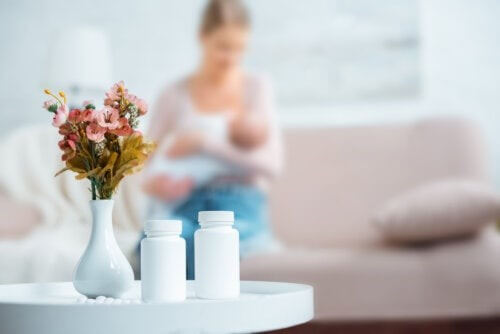Breastfeeding and Antibiotics: What You Should Know
Some antibiotics can be excreted in breast milk and cause problems in babies. Learn more about this in the following article.

Antibiotics or antimicrobials are very common drugs throughout the world. Their effectiveness is unquestionable as they save the lives of millions of people suffering from infectious diseases year after year. But how do antibiotics affect breastfeeding and the baby’s health in general? Is it necessary to interrupt breastfeeding or change the treatment? Find out all about it in this article!
Breastfeeding and antibiotics: can antibiotics affect breast milk?
Depending on the chemical characteristics of antibiotics, a trace of antibiotics may be excreted through breast milk. Sometimes, the presence of other substances, such as calcium, can inactivate them. However, they can also be released and consumed as such by babies.

However, the nutritional properties of milk aren’t usually altered by the use of medicines. So, from a nutritional point of view, its effects are preserved.
Find out more: Bacterial communities in breast milk
Breastfeeding and antibiotics: does it cause problems in babies?
All drugs can induce adverse reactions and this depends on many factors. However, when we ingest the correct dose, it’s impossible to know when and what reaction will occur. When a baby consumes breast milk containing a small amount of the antibiotic taken by the mother, it’s unlikely for a problem to develop.
This is because small concentrations are usually unable to generate alterations in the baby’s body. Of course, this depends not only on the amount, but also on the type of drug in question. That’s why some are low and others are high risk.
There are only a few antibiotics that you shouldn’t take during breastfeeding. According to a publication by the Spanish Association of Primary Care Pediatrics, these include chloramphenicol, telithromycin and thiabendazole, the latter being more specifically an antiparasitic.
Some important effects of antibiotics on breastfeeding
When these small concentrations of antibiotics generate effects in infants, they’re usually related to gastrointestinal problems such as vomiting, diarrhea or abdominal distension. Even if unlikely, a clinical picture known as gray baby syndrome may develop in infants with hepatic immaturity.
This condition develops due to the direct administration of chloramphenicol to infants, not through breast milk. The most obvious symptoms are changes in skin coloration and digestive problems. Nevertheless, it’s also accompanied by cardiovascular disorders capable of causing death.
Find out more: Learn all about newborn jaundice
Are there alternative treatments?
It’s important to note that only a qualified medical professional should prescribe a treatment with antibiotics. This isn’t only because of the number of adverse reactions that can occur, but also due to the risk of developing bacterial resistance to these drugs.
In most cases it’s possible to continue breastfeeding while taking antibiotics. Voluntarily discontinuing breastfeeding while receiving treatment may have greater consequences for the baby than taking the drug, as long as the drug has a low risk of causing health problems.

If in doubt, seek professional advice
As we’ve mentioned on several occasions, a health professional should be the one to indicate when to start and when to discontinue a treatment. There are several aspects to take into account, both for the mother’s and the baby’s health.
These include the presence of previous illnesses, the type of medication, the mother’s state of health and the general context of the treatment.
Antibiotics are safe drugs in most cases
Yes, you can take antibiotics during breastfeeding. However, there are some rare exceptions where it’s better to avoid them or use another type of drug. If you go through this situation and observe any health problems in you or your baby, it’s best to stop taking the drug and see a doctor.
